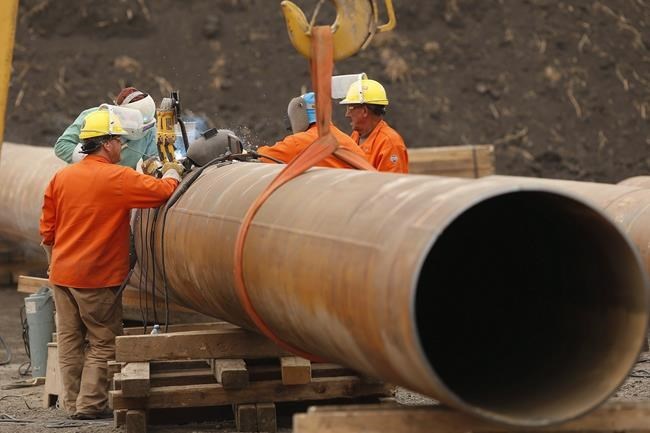CALGARY — Enbridge Inc., the operator of the largest crude oil pipeline network in North America, says it will reduce its greenhouse gas emissions intensity to net zero by 2050.
The Calgary-based company's pledge on Friday puts it in a growing club of parties making the 2050 pledge that includes the Canadian government, Vancouver-based miner Teck Resources Ltd., oilsands producer Cenovus Energy Inc. and international oil companies like Repsol, to name a few.
Enbridge is also aiming to reduce emission intensity by 35 per cent by 2030 compared with 2018.
"This isn't our first rodeo at ESG, we've set and met targets in the past," said Enbridge CEO Al Monaco on a conference call, adding the company considers its environmental, social, and governance initiatives to be "not a nice-to-have but a must-do."
"The new targets are about getting even better," he said.
He outlined four ways for the company to reduce its Scope 1 direct emissions from owned or controlled sources and Scope 2 indirect emissions from purchased energy and other products.
They include modernizing equipment, applying technology to reduce emissions and consumption, using lower carbon sources of fuel for pumps and compressors, self-powering facilities with solar arrays and investing in "nature-based offsets."
Enbridge also plans to track how its ongoing investments in low-carbon projects such as wind farms affect indirect Scope 3 emissions — which occur in the production and consumption of the oil and gas it handles — without making a specific target, Monaco added.
The announcement was greeted with skepticism by Keith Stewart, senior energy strategist for Greenpeace Canada, who suggested it is little more than "marketing."
"Investors want to see real decarbonization plans and until Enbridge accepts the challenge of becoming a 100 per cent renewable energy company, this is simply greenwashing," he said.
"Using solar energy to power the pumps that push oil and gas through your pipelines can't hide the fact that you're still selling fossil fuels."
Institutional shareholder adviser Aequo, however, issued a press release commending Enbridge, noting it has been asking the company to more meaningfully embrace emission targets for the past two years.
“Setting a net zero target is an important step," said Francois Meloche, director of shareholder engagement.
Enbridge also unveiled diversity targets, aiming to grow the racial and ethnic part of its workforce to 28 per cent and the female portion to 40 per cent. It also wants to have 20 per cent racial and ethnic and 40 per cent female board membership by 2025.
On the call, Enbridge said it is weeks away from getting the final permits it needs to construct its Line 3 replacement oil pipeline through Minnesota, estimating construction time of six to nine months when they are in hand.
Presidential candidate Joe Biden has pledged to cancel the presidential permit for the rival Keystone XL pipeline if he is declared the winner but Vern Yu, Enbridge's president of liquids pipelines, said he's not worried Line 3 will be affected.
"We should remind you that under the prior (Obama) administration, where Mr. Biden was the vice-president, we were able to get all of our cross-border permits," he said on the call.
The company reported third-quarter net earnings of $990 million, up from $949 million in the same quarter last year, as cash from operations fell to $2.3 billion from $2.73 billion.
On an adjusted basis, Enbridge said it earned $961 million or 48 cents per share for the quarter, down from an adjusted profit of $1.12 billion or 56 cents per share a year earlier.
Analysts on average had expected a profit of 53 cents per share, according to financial data firm Refinitiv.
This report by The Canadian Press was first published Nov. 6, 2020.
Companies in this story: (TSX:ENB, TSX:TECK, TSX:CVE)
Dan Healing, The Canadian Press



